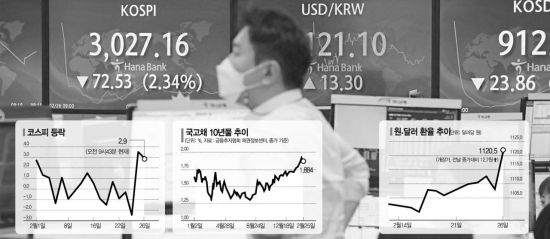
U.S. Treasury yields rise in anticipation of rising prices and economic recovery
The 10-year Treasury Bond yield also threatened 2%
Won-dollar exchange rate surged by 12.7 won. The maximum increase in 11 months from the previous day’s closing price
The preference for risky assets is greatly reduced… Threatened with the KOSPI 3000 line
The Bank of Korea “will buy 5~7 trillion KTBs in the first half”
[아시아경제 김은별 기자, 이민우 기자] US Treasury yields are soaring, and preference for risky assets is falling sharply. The won-dollar exchange rate rose by 13 won at the beginning of the market, and the KOSPI index was on the verge of falling below the 3000 line again. Bitcoin, a virtual asset, is also plummeting. Judging that the market volatility is not severe, the Bank of Korea announced plans to purchase KTBs ahead of expectations. Experts say the volatility of the treasury bond yield will not last long, but that the US Federal Reserve (Fed) will not tighten the currency even if it allows inflation to rise. Pointed out.
On the 26th, the won-dollar exchange rate in the Seoul foreign exchange market opened at 1120.5 won per dollar, up 12.7 won from the previous day’s closing price. Since then, it has maintained the trend of 1120 won. The dollar was strong in the aftermath of a surge in government bond yields in the US market last night, and the preference for risky assets among investors declined sharply, pushing up the won-dollar exchange rate. The opening width (gap up) of the exchange rate compared to the previous day’s closing price was the largest since March 23, last year (18.5 won). March 23 last year was the day when the KOSPI index 1500 line was broken and the market shook greatly. The level of exchange rate itself was not high as it recorded 1123.81 won at the beginning of this month, but it means that the impact of the US market interest rate and the dollar index movement on the domestic market was that much this time considering the time difference between Korea and the US.
Exchange rate, soaring more than 12 won
The reason why the won-dollar exchange rate soared is that inflation has risen among investors and expectations of an economic recovery emerged. In anticipation that inflation will rise, the US Treasury bond yield soared to 1.614% during the day before, and the 10-year Korean Treasury Bond yield reached 1.966% as of 10:34 am on the day before. It was traded in the late 1.8% range just the previous day, but it jumped 8bp (1bp = 0.01% point) in one day. Initially, the market saw the 2% interest rate on 10-year KTBs as the critical point.
When bond yields rise due to inflation expectations, funds usually run out of the stock market. When there is an expectation that inflation will rise, bond prices fall (bond interest rates rise). Even if the same interest is received, the real interest rate taking into account the inflation rate decreases, which reduces the attractiveness of interest-paying products. If you previously owned bonds, you would lose money because the price drops, but new investors will be buying bonds. As stock investors move to the bond market, stock prices naturally fall. Another reason why stock investment is less attractive to companies is that the interest burden of companies that have already made loans may increase if bond rates rise.
Therefore, the KOSPI index, which soared more than 100 points the day before, is in danger of falling below the 3000 line again in two days. As foreigners and institutions are departing, it is in the form of increasing decline. The domestic stock market has fluctuated in the mid to late half of the 2% range for 3 consecutive trading days. In the meantime, the KOSPI rallied sharply from 2094 to 3099. As of 9:55 am on the day, the KOSPI recorded 3013.04, down 2.80% (86.65 points) from the previous day. After starting weakly at 3089.49, the decline has rapidly increased. By 9:35 am, it fell to 3005.02 and sank to just before the collapse of the 3000 line. Selling taxes by foreigners and institutions lowered the index. They net sold 589.2 billion won and 765 billion won respectively. Individuals net bought 1.346 trillion won worth, but could not prevent the index decline. The KOSDAQ also recorded 910.61, down 2.75% (25.60 points) from the day before the same time. After all, it started off weakly, but it rapidly increased the fall. At 9:36 am, it was about to go down to 906.73. In the KOSDAQ market, both foreigners and institutions continue to sell.
BOK expands purchase of KTBs… “I will buy 5~7 trillion won in the first half”
As the market suddenly shakes, the BOK announced on the day that it plans to simply purchase KTBs for 5 to 7 trillion won in the first half of this year. In September of last year, it announced that it would purchase 5 trillion won by the end of last year, but this time, it expanded the range to 5 to 7 trillion won, further demonstrating the BOK’s willingness to purchase KTBs. An official from the BOK explained the reason for proactively stating the size of the purchase of KTBs, saying, “Amid the recent increase in volatility in market interest rates, the volume of KTB issuance is expected to increase considerably due to the formation of an additional budget (additional budget).” The BOK plans to announce the purchase date, size, and stock on the business day before bidding in consideration of future market conditions. The BOK purchases through competitive bidding with multiple interest rates against institutions subject to simple securities trading. A BOK official emphasized, “Apart from the expansion of simple purchases, if necessary, such as when the market interest rate fluctuates, additional measures will be taken to stabilize the market.” Reporters Eunbyul Kim and Minwoo Lee silverstar@
Reporter Eun-Byeol Kim [email protected]
Reporter Lee Min-woo [email protected]
